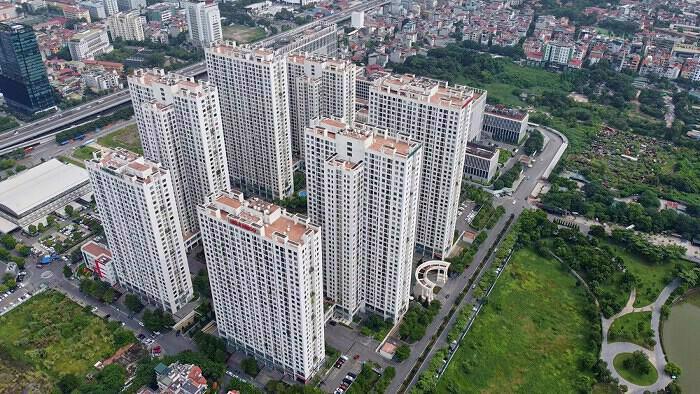Commercial real estate sectors, including industrial, office, and retail, remained resilient throughout 2023 while the housing sector witnessed another quiet year, according to Avison Young Vietnam’s fourth quarter 2023 quarterly knowledge report on Vietnam’s real estate sector, released on January 12.
The report reveals the agility of the country’s real estate market despite the global economic challenges and certain domestic flaws. While the level of impact and the speed of recovery vary in each sector, the overall prospects for Vietnam’s real estate market are positive.
Market sentiment has improved since 2022. Revised laws on real estate have been ratified, and the long-awaited Land Law 2023 is expected to be approved in early 2024.

With the ongoing relocation of manufacturing and logistic facilities to Vietnam, northern industrial real estate markets such as Hai Phong, Quang Ninh, Hung Yen, Ha Nam, Vinh Phuc, and Thai Binh will be the key beneficiaries. In the south, the three provinces of Ba Ria-Vung Tau, Binh Phuoc, and Tay Ninh could be future industrial hotspots. Some mid to long-term trends driving changes in the supply of industrial properties include sustainability, the consumer-driven retail market, acceleration of e-commerce, shifts from just-in-time to just-in-case inventory management, and supply chain diversification.”

With the ongoing relocation of manufacturing and logistic facilities to Vietnam, northern industrial real estate markets such as Hai Phong, Quang Ninh, Hung Yen, Ha Nam, Vinh Phuc, and Thai Binh will be the key beneficiaries. In the south, the three provinces of Ba Ria-Vung Tau, Binh Phuoc, and Tay Ninh could be future industrial hotspots. Some mid to long-term trends driving changes in the supply of industrial properties include sustainability, the consumer-driven retail market, acceleration of e-commerce, shifts from just-in-time to just-in-case inventory management, and supply chain diversification.”
Though uncertainties put the brakes on some industrial real estate transactions, overall the sector experienced a relatively smooth 2023 with growth indicators seen. Nationwide, land rents remained stable, and even rose slightly in Hanoi, with high occupancy rates.
2023 also witnessed the commencement or establishment of new projects, promising to introduce new, high-quality supply of industrial land and facilities over the next couple of years.
As of the end of 2023, average rents for industrial land in Ho Chi Minh City stood at $232 per sq m per term. Tenants filled 93 per cent of the total area; a slight year-on-year increase of 2 per cent.
In Hanoi, average rents hit $188 per sq m per term, with 90 per cent occupancy.
Local authorities in both cities have set out plans to transform existing industrial parks into new and modern industrial models to serve hi-tech and high-value industries. Examples include the establishment of the Ho Chi Minh City Semiconductor Electronics Center in the southern city and the Vietnam-Korea Techno Park Complex in Hanoi.
In contrast to the upwards trend of previous years, office rents in Vietnam fell slightly in 2023. In the fourth quarter, Grade A and B offices in the CBD of Ho Chi Minh City had average rental prices of $60.5 per sq m per month and $35.5 per sq m per month, respectively; declines of 2.4 per cent and 1.4 per cent year-on-year. Similarly, Grade A and B rents in central Hanoi were $34.5 per sq m per month and $25.8 per sq m per month, respectively, down slightly compared to the end of 2022. Occupancy rates in the two markets remained relatively balanced.

Changes in consumer behavior, especially among Millennials and Generation Z, are sure to drive the transformation in retail space. While there is some resistance to change, especially in small business premises, positive developments have been recorded in commercial centers and retail complexes. Retailers will increasingly focus on raising their service quality and combining omni-channel sales as land funds for commercial and service purposes become more limited in the next one to three years. We expect fierce competition in retail, when e-commerce, cashless payments, and deeper penetration of international retailers come into full swing.”

Changes in consumer behavior, especially among Millennials and Generation Z, are sure to drive the transformation in retail space. While there is some resistance to change, especially in small business premises, positive developments have been recorded in commercial centers and retail complexes. Retailers will increasingly focus on raising their service quality and combining omni-channel sales as land funds for commercial and service purposes become more limited in the next one to three years. We expect fierce competition in retail, when e-commerce, cashless payments, and deeper penetration of international retailers come into full swing.”
The market slowdown and increasing competition due to new office buildings beginning operations were the main causes of declining office rents. Business uncertainties, a shift to a floating structure in costs and personnel, health and wellness requirements, and ESG (environment, social, governance) commitments drove tenant decision-making, be it a new lease, expansion, or relocation.
In the second half of 2023, Ho Chi Minh City saw new high-quality office space, such as The HallMark, The Mett, and VPBank Saigon Tower. These projects contributed to the market’s overall leasable area of nearly 2 million sq m, with Grade A space accounting for about 60 per cent.
The Hanoi market, meanwhile, added 28,588 sq m of Grade A office space to its supply from the Lotte Mall West Lake commercial complex, which was launched in September.
The office sector is prone to fluctuations in the market and workforce. However, it is traditionally a long-term income-generating asset, particularly in Vietnam, where the business environment is vibrant and the in-person work culture remains common. The downwards adjustment in rents can be, in the short term, helpful for retaining and attracting tenants. However, it is expected that pricing will continue its upwards trend, followed by more modern office buildings that meet sustainability criteria in the market.
In the condominium and landed property sector, challenges endured throughout 2023. Supply imbalances, increasing land prices and construction costs, financial bottlenecks, and mismatched expectations among market participants dampened liquidation, making 2023 a timid year for the residential sector.
In Ho Chi Minh City, there were 6,500 new units opened for sale in the final months of 2023; a decline of more than 70 per cent year-on-year. Over 90 per cent of apartments, or 5,850 units, belong to the mid-end segment, with an average selling price of $1,500-3,500 per sq m.
Meanwhile, in Hanoi, the average selling price across segments had risen 5 per cent as of the end of 2023 and ranged from $2,240-4,075 per sq m. The introduction of budget-friendly projects like Tecco Garden and Moonlight 1 highlighted new supply over the past year, along with high-end projects such as Canopy Residence, The Westeria, Lumi Hanoi, and The Zurich.
It is expected that the residential sector will see an uptick from 2025 onwards, thanks to the strong intervention of the Vietnamese Government in the last two years and as new real estate laws take effect. Moreover, merger and acquisition (M&A) activities will bring new market players through capital contribution agreements or project share purchases.
| Mr. David Jackson, Principal and CEO of Avison Young Vietnam. "The continuous improvement in administrative and legal frameworks and the measures to stabilize the real estate market have brought back investor confidence to some extent. Investors have been searching and expanding their real estate portfolio in Vietnam during the market slowdown in the last two years. Sectors of interests include residential, office, retail, industrial, and hospitality. However, some persistent legal and financial bottlenecks have contributed to slowed transactions. With new laws and regulations in place, it is expected that market improvement will be seen more vigorously from 2025 onwards." |









 Google translate
Google translate